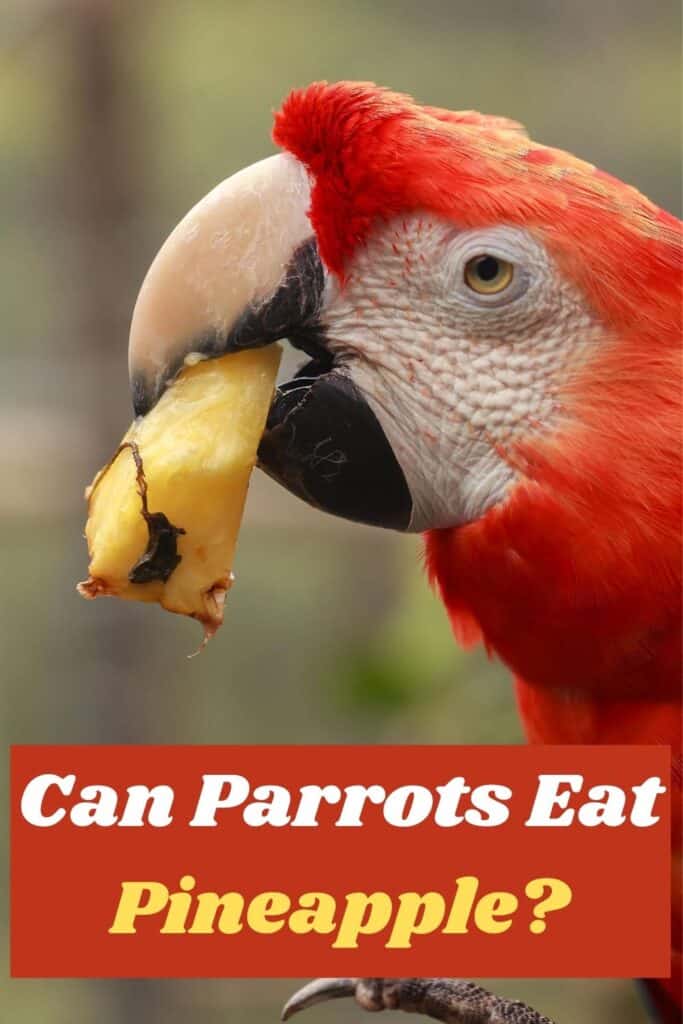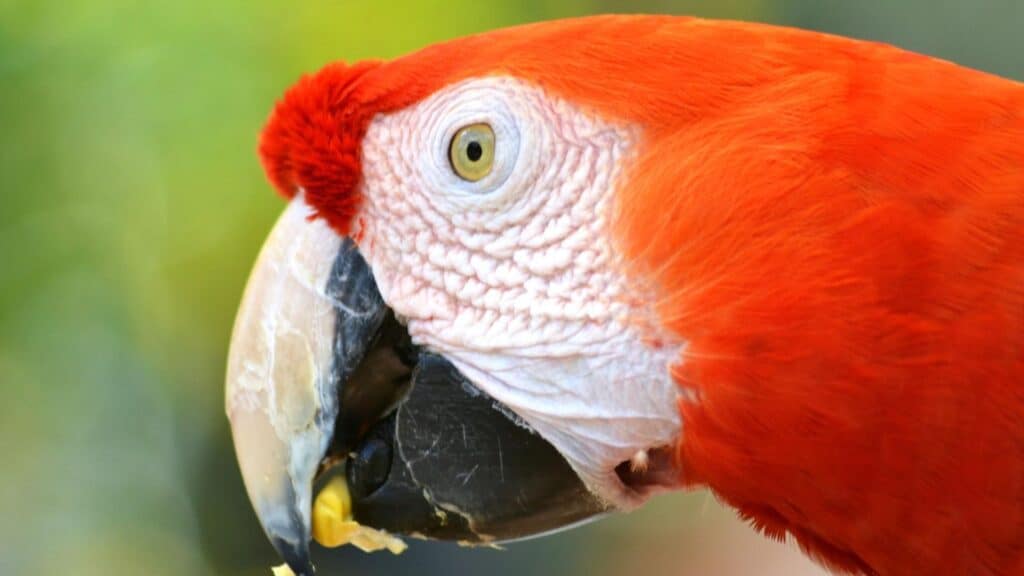Parrots and pineapples have a lot in common. Both are colorful, attractive, and are native to the humid and hot tropical regions of the Amazon River basin. Pineapple is an immensely tasty golden yellow and orange fruit. The short-stemmed bromeliad plant is known as Ananas in Latin. Ananas is a word that stems from the South American Tupi-Guarani Indian name ‘nana’ meaning ‘fragrant excellent fruit’.
The parrot is a member of the Psittaciformes order. In it are three hundred and fifty other multicolored bird species. They include macaws, parakeets, cockatoos, and cockatiels.
Unlike the pineapple that only thrives in tropical regions, parrots can live in warm and snowy climates alike. This is the reason this amazing bird that mimics human speech is one of the most popular pets in the world.
Like most birds, parrots like fruits and especially sweet fruits like pineapples. Pineapples should be a part of your parrots diet but limited to small portions served weekly not daily. Too much natural sugar can be harmful for your parrot. Parrots have for centuries fed on the pineapple out in the wild forests of South America.

Table of Contents
Parrots can eat pineapples
Parrots are social birds, which live in flocks out in the wild. They are omnivores, eating vegetation and meat. Their natural diet comprise plenty of fruit, seeds, nuts, flowers, and buds.
Their hardy jaws and curved beaks can snap open most fruit peels and nutshells to get the healthy goodness that lives within them. These highly intelligent birds especially love pineapples.
Some of them love this exotic, tasty fruit so much that they can tell pineapple fruit cans by their label.
Pineapples are an antioxidant and vitamin-packed fruit that is not only popular with birds but humans as well. Parrots have for centuries fed on the pineapple out in the wild forests of South America.
Consequently, you can feed your pet parrot their fair share of pineapple with no worry. These fruits are safe for your avian friend and supply them with much-needed nutrition and health benefits. Some of these benefits include;
- Phenolic acids and flavonoids, antioxidants that stave off oxidative stress, aging and DNA damage
- Nutrients and vitamins that suppress inflammation and boost immunity
- Bromelain, an enzyme the reduces inflammation markers in your parrot’s body
- Digestive enzymes that break down amino acids and proteins for easy digestion and storage, easing bowel movements in birds.
Should parrots eat pineapple skin?
One stand out character of tropical birds like parrots is their vibrantly colored plumage. The parakeet, macaw, and parrot are not only some of the most intelligent birds there are, but some of the most beautiful.
The wide array of vibrant colors on their feathers might result from a mutated gene and enzymes that synthesize the wide array of pigments.
A study from Monash University on carotenoids shows that these plant pigments that give veggies and fruits their amazing yellow, bright red, and orange hues have exceptional health benefits.
Carotenoids are plentiful in nature and when eaten by animals, help in protecting cells from toxins and radiation effects.
They also give birds their characteristic red, orange, or yellow colors. Upon ingestion, these plant-based pigments will convert to Vitamin A, boost the bird’s immune defenses, and add color to their feathers.
Most vets say that Vitamin A deficiency is one of the most prevalent dietary problems with caged birds. Some pet owners will give their beautiful avian friends Vitamin A supplements, but the perceptive parrot owner will give them foods rich in this vitamin A and beta-carotene.
Do you know that the king of fruit’s skin is a rich source of beta-carotene? This skin of the juicy exotic fruit is not only safe for your parrot bird to eat but it can supply nourishment needed to keep its colorful plumage more beautiful.
This rich source of Vitamin A will also help protect your bird’s vision and supply manganese that aid the growth of strong bones in pet birds. The manganese from the skin of the pineapple fruit will help stabilize your pretty bird’s moods and blood sugar level and give it energy as well.

Can you feed your parrot the core of the pineapple?
The core of your juicy yellow fruit is not only healthy for humans, but your little buddy too. It has a lot of Vitamin C and fiber in it that protects the bird’s immune and digestive system.
Vitamin C will help protect the bird’s vision and keep its system free from cancers, heart disease, and muscular diseases. Like the skin, the core has manganese that helps your tiny friend absorb more iron to its body, boosting its immune functioning and its energy.
Should you give a parrot pineapple juice?
There is no better way for you to bond with your feathered friend than over a natural juicy drink like pineapple juice. This savory mix of fruity goodness is a fantastic source of antioxidants, bromelain and vitamin C.
Parrots should have nothing other than natural fruit juice. Easily available processed fruit juice is not healthy, because it has been stripped clean of most vitamins and nutrients.
Processed pineapple fruit juice will also have sugar additives that will give your avian friend a sugar spike. What will follow is a period of aggression, low energy, and moody, depressive behavior.
Too much fruit juice will lead to polyuria, a healthy and natural condition characterized by softer feces and changes in the color of your bird’s urine. Polyuria should not cause any alarm, but it is advisable to give your pineapple-loving friend fruit juice in moderation.
Conclusion
Pineapples and parrots are the perfect pair. Give them to your pretty bird on moderation and watch it flourish and grow to a ripe old age.





